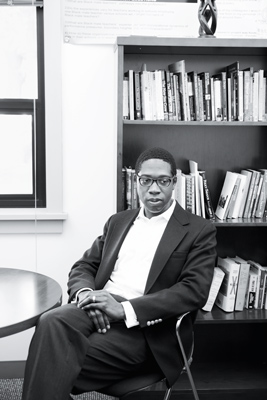By Katherine Duke ’05
African-American men are underrepresented as U.S. public school teachers. How come?
[Education] Students of color will soon constitute the majority in U.S. public schools, but teachers of color remain a minority, and, at least in some major cities, their numbers are decreasing. Nationwide, African-American men make up less than 2 percent of public school teachers and have an especially high rate of job turnover. To understand why, Travis Bristol ’03 undertook one of the largest qualitative studies ever on urban black male teachers.
Bristol conducted the research—the basis for his doctoral dissertation at Columbia University’s Teachers College—in Boston, starting in 2012. He studied 27 black male teachers in 14 public schools, categorizing each as a “Loner” (the only black male teacher at his school) or a “Grouper” (one of several at his school).

Groupers, by contrast, worked mainly in low-performing schools where, they told Bristol, administrators micromanaged their teaching and they were too often expected to focus on discipline.
By the next fall, all seven Loners remained at their jobs, but nine out of 20 Groupers had left. Some of these moved on to other education jobs; others exited the profession entirely. One quit teaching after watching an administrator frisk students during a statewide exam to make sure they weren’t hiding cell phones.
Drawing from his research, Bristol has published recommendations on the Albert Shanker Institute’s blog. Among them: create opportunities for black high school boys to try out teaching. Despite support and attention for his study—he’s won coveted dissertation fellowships—the Boston district hasn’t yet reviewed Bristol’s ideas, he says. This frustrates him, because he sees the issue as one of national importance.
It’s also personal. Growing up in a poor area of Brooklyn, Bristol had only two black male K–12 teachers. At Amherst, he found his schooling had underprepared him for college, and when he took “English 6: Reading, Writing and Teaching,” he realized his struggles were part of a systemic problem. Bristol felt a responsibility to “improve not only the learning outcomes but eventually the social outcomes for people very similar to me.”
As he pointed out on NPR’s RadioBoston, previous studies suggest “that having a black male teacher improves learning outcomes for black students.” In addition, Bristol believes, their ideas benefit the entire teaching profession.
Working in two New York City public schools, Bristol developed one such idea, pioneering mentoring programs for young men of color. He left classroom teaching on the expectation that being a researcher with a Ph.D. will better position him to effect broad changes. Now a postdoctoral research fellow at the Stanford Center for Opportunity Policy in Education, he hopes, within a few years, to join the faculty of a college or university.
Beyond that? When Brandon Stanton photographed him for the blog Humans of New York on the day he graduated from Columbia, Bristol declared: “One day I will be in charge of the New York City public school system.”
Katherine Duke ’05 is the assistant editor of Amherst magazine.
Jen Siska photo